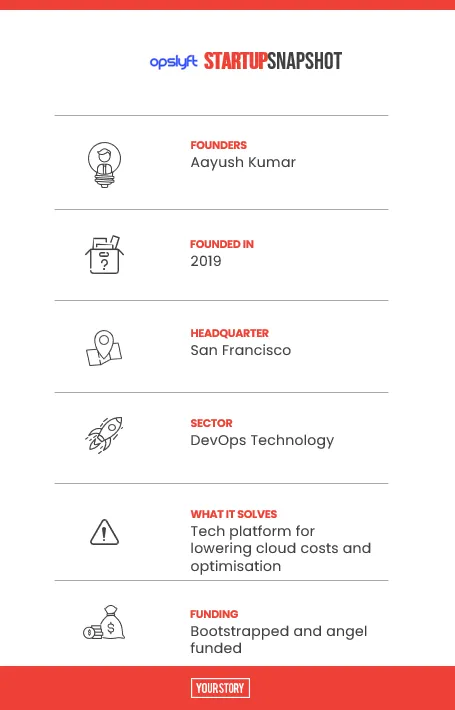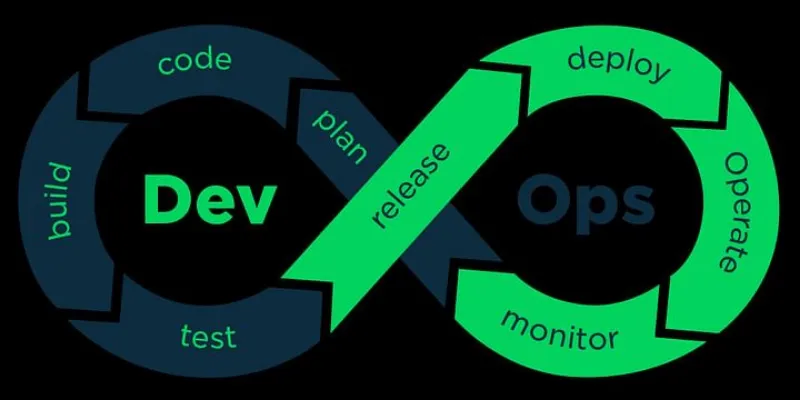This startup helps enterprises save on cloud spends and tech infrastructure
Noida-based OpsLyft is a DevOps focussed technology startup that allows enterprises to effectively monitor their spends on cloud and usage of infrastructure to enable better return on investments.
A D2C soonicorn saved around Rs 30 lakh on its infrastructure technology spends and a healthcare focussed unicorn bought down costs on its cloud platforms from double digit percentage of its revenue to single digit.
This was possible due to the solutions developed by , A technology startup based out of Noida that is focused on DevOps.
Started in December 2019 by Aayush Kumar, the startup is registered in San Francisco.
The journey
After completing his engineering in 2016, Aayush worked with a SaaS startup and witnessed the challenges faced by DevOps engineers first hand. DevOps are set of tools and applications which are built on a continuous basis to bring in the agility and solutions for the technology infrastructure of any organisation.

Aayush saw DevOps engineers were spending considerable amount of time and energy to create technology solutions, which could address the twin challenge of monitoring the spends on cloud platforms and optimise the use of infrastructure network.
There were third party tools available to do these tasks, but the engineers had to spend time on connecting all different solutions. The key point here being this could not be the core function for the technologists as their focus needed to be on creating solutions, which will help the business grow.
The opportunity
Aayush took a three-month break from his work to see if he could come out with a platform which could automate all these tasks and create a simple dashboard where the enterprise is able to get insights on a real-time basis on their cloud spend as well as the usage of the technology infrastructure.
“I did not find any solution which could say it operates as a single DevOps tool or platform and this made me realise there is a clear need in the market,” says Aayush.
In today’s fast changing pace of technology, enterprises need to continuously monitor how much they are spending on their cloud platforms and also whether they are optimally using all their hardware and software assets.
Typically, the engineers spend a lot of time going through various point solutions which are available as well the graphs, charts, and dashboards, but there is no single point of visibility.
“The engineers need to study all this and make sense of what is the best return on investment they can get from their technology,” says Aayush.
Creating a unified solution
Aayush then came up with OpsLyft, a unified devops technology platform that provides all the insights on cloud spend management and infrastructure usage management for any enterprise.
“Enterprises can use our platform to monitor and take action on how they spend on cloud or using their technology platform, which is the top priority for any devops engineers,” says Aayush.
OpsLyft claims that its technology platform, which works on a plug-and-play model, can provide all the actionable insights.
“Our key goal is to allow enterprises to run any kind of application on the cloud without affecting their performance and at a lower cost,” says Aayush.
OpsLyft has six paying customers now and all these belong to the new age technology sector, which are based in India.
The clients of OpsLyft include , , , to name a few. The startup claims it has helped save more than $20 million in cloud bills for its clients.

According to Aayush, the enterprises which have deployed their solutions have started to see gains and in some companies they have redeployed the devop engineers to other tasks rather than being focussed on spend management.
The market
Today, OpsLyft is focussed on four themes -- cloud costs budgeting and predictability, infrastructure cost and usage visibility, infrastructure management, and map cloud costs to business metrics.
According to this startup, cloud market globally is expected to reach a size of $850 billion by 2025 from the present levels of around $400 billion. This is expected to create a market opportunity of $150 billion for DevOps.
OpsLyft enters into an annual contract with its client and the solutions are provided on a SaaS model. The founder says there is no direction competition for them in the India market though there are a few companies in the US which provide similar solutions.
The startup has been focussed on the India market as of now as it has found strong traction for its platform, given the high degree of maturity around cloud technologies.
OpsLyft raised $500k in seed funding from leading angel investors such as Anand Chandrasekaran and co-founders from other leading startups such as Innovaccer, and . This round also saw participation of executives from companies such as and .
Future plans
The startup is now looking to tap into the US market. OpsLyft is also looking to add some more features on its technology platform like bringing in the aspects of security, expense management, automated workflow, analytics, etc.
“People often look at cloud spend as a non-priority area as it is not directly related to business outcome. We are now building a governance solution where this can be monitored at all levels of the organisation starting from CFO all the way to the engineer,” says Aayush.
“Our endeavour is to constantly add newer solutions. We started with spend management, but we will get into other areas to build a unified devops platform to address many use cases,” he adds.
Edited by Megha Reddy





